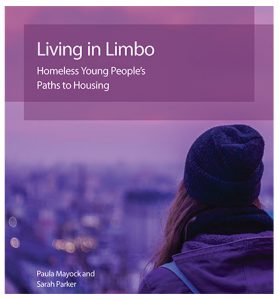
By Ann Marie Foley - 31 May, 2017
 Research covering a two-year period has shown that only one quarter of young people get out of homelessness. The other three-quarters remain homeless, staying in B&Bs, sleeping rough or living in inadequate, insecure accommodation.
Research covering a two-year period has shown that only one quarter of young people get out of homelessness. The other three-quarters remain homeless, staying in B&Bs, sleeping rough or living in inadequate, insecure accommodation.
Earlier research (Mayock et al., 2008, 2011) reported that a far higher proportion (57 per cent) had exited homelessness after just one year.
Former President Mary McAleese launched the research, Living in Limbo – Homeless Young People’s Paths to Housing, in Trinity College Dublin on Monday (29 May).
At the launch, she said that homeless young people have a “shambolic existence”.
The research, done on behalf of five housing and homeless organisations, highlights the negative consequences of homelessness, such as lack of access to education and health services and poor or non-existent employment prospects.
Speaking on behalf of the charities involved, Mike Allen of Focus Ireland said: “The research shows there are many reasons young people become homeless but it also clearly indicates there are very targeted measures that can – and must – be put in place to prevent more young people becoming homeless next month, next year and in coming years.”
The longitudinal research followed 40 young people over a two-year period and examined the factors, experiences and circumstances that impact their homeless and housing situations over time.

Authors Dr Paula Mayock and Sarah Parker with former President Mary McAleese at the launch of the report
The study was carried out by Dr Paula Mayock and Sarah Parker of Trinity’s School of Social Work and Social Policy. It highlights causes of homelessness among young people, including family breakdown, leaving State care, early school leaving and lack of access to employment.
“The findings of this research clearly demonstrate that a majority of the study’s young people were unable to exit homelessness and move to stable housing. This failure to find a resolution to their homelessness meant that many had already joined the ranks of the long-term homeless when we interviewed them for a second time,” said Dr Mayock.
She explained that the consequences of ongoing homelessness for young people’s health and well-being are extremely negative, and affect their prospects of finding stability and security in all areas of their lives.
Focus Ireland, Simon Communities of Ireland, Threshold, the Peter McVerry Trust and the Society of St Vincent de Paul collectively funded the research. After two years, 29 of the study’s 40 young people were re-interviewed. Of these, only 24 per cent were in housing. The remaining young people (76 per cent) were either homeless or living in insecure accommodation.
Lack of access to affordable housing was one of the key reasons these young people remained trapped in homelessness. Other problems that contributed were: restrictive/inadequate rent supplement payments, long waiting periods for social housing, complex and unmet support needs, delays in welfare payments and discrimination by landlords towards people in receipt of rent subsidy.
The study found that the lack of access to housing forced many of the young people into situations of ‘hidden’ homelessness. This saw them ‘sofa surfing’ in the homes of family members, friends and acquaintances.
The five organisations who funded this report also warned of a deepening youth homelessness crisis, as the number of 18- to 24-year-olds has increased by 82 per cent in the last three years.
Figures from the Department of Housing, Planning, Community and Local Government reported that 793 young people were homeless and in emergency accommodation in the week of 24 to 30 April 2017. This was an 82 per cent increase from 436, the earliest figure available (April 2014). Young people aged 18 to 24 make up just over 10 per cent of the record number of 7,680 people who are currently homeless in Ireland.
The report called for more resources to be directed towards securing housing and services for young people through an innovative ‘Housing First for Youth’ approach. This provides young people with housing as quickly as possible and then provides targeted, person-centred supports in housing including healthcare, counselling, education, training, financial advice and more.